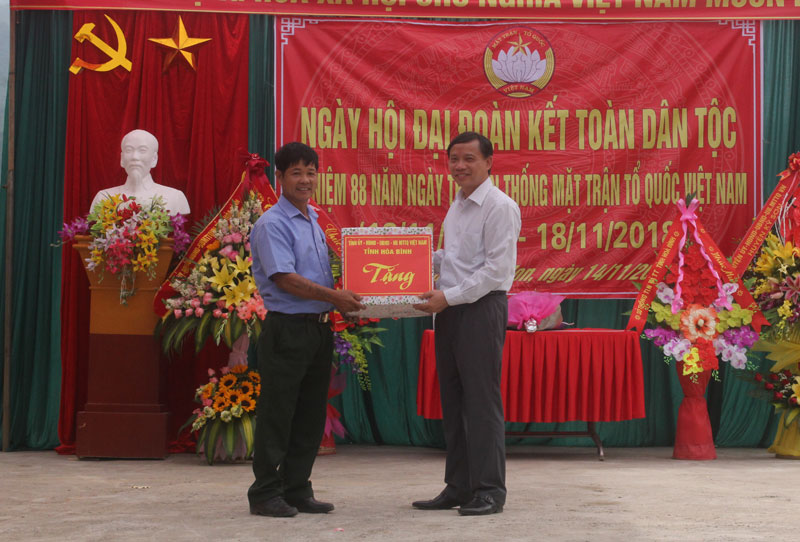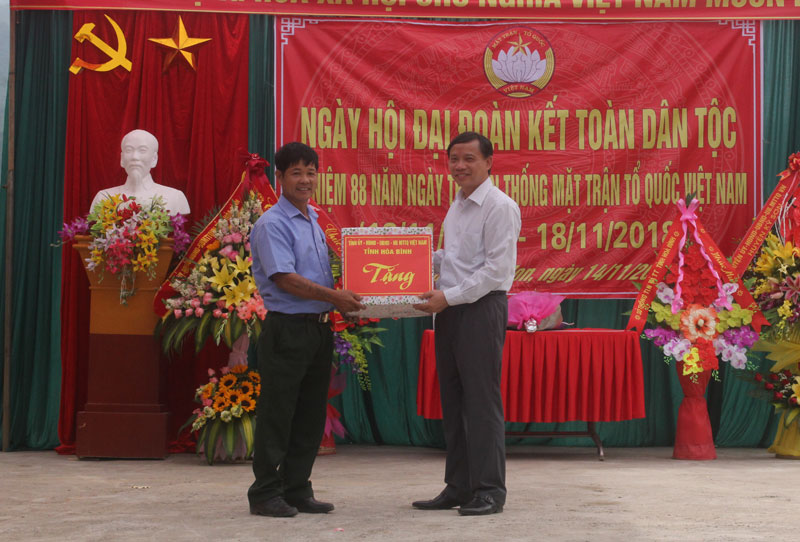
(HBO) – Vice Chairman of the People’s Committee of Hoa Binh province Bui Van Khanh joined a great national unity festival with people in Mon village, Phuc Tien commune of Ky Son district, on the occasion of the 88th traditional day of the Vietnam Fatherland Front (November 18, 1930 - 2018).
Mon village
is home to 99 households with 406 people, 98 percent of whom belong to the Muong
ethnic group. The population live in three residential clusters along the road
connecting Phuc Tien and Phu Minh communes.
Under the
leadership of the local Party committee, the VFF chapter in the village has
joined hands with local authorities, organisations and local people to efficiently
perform their tasks in socio-economic development, defence-security and the
campaign on building new-style rural areas and civilised urban areas in 2018.
Accordingly,
the poverty rate of the village stood at only 4 percent (4 out of 99 families) and
there is no family living just above the poverty line. The average income per
capita in the area is estimated at 30 million VND (nearly 1,300 USD) per annum,
an increase by 2 million VND from last year.
About 95
percent of the families received dissemination on policies and regulations,
while all households are connected to the national power grid. Around 90
percent of local roads were concretised, facilitating transport and economic
growth of the residential areas.
As a result
of the campaign on building new-style rural areas and civilised urban areas in
2018, 95 percent of local households earned the title "Cultural Family”, and
Mon village was recognised as a Cultural Residential Area.

Vice Chairman of the provincial People’s Committee Bui Van Khanh
presents gifts to Mon village in Phuc Tien commune.

Local families sign emulation commitments in 2019.
In
2019, Mon village sets itself the targets to win the title of Cultural
Residential Area for another year, as well as keep the ratio of cultural
families at 95 percent and raise average per capita income to 32 million VND
(1,370 USD).
On
the occasion, Phuc Tien commune presented the certificate of Cultural Family
for Three Consecutive Years to 49 families and the certificate of Cultural
Residential Area to Mon village./.
With an increasingly vibrant and widespread emulation movement aimed at building cultured residential areas and cultured families, Yen Thuy District has been making steady progress toward improving both the material and spiritual well-being of its people, while fostering a civilized, prosperous, beautiful, and progressive community.
Once lacking recreational spaces and community facilities, Residential Group 2 in Quynh Lam Ward (Hoa Binh City) has recently received attention for the construction of a new, spacious, and fully equipped cultural house. The project followed the model of state support combined with public contributions in both labor and funding.
The "All people unite to build cultural life" movement, which has been effectively integrated with Kim Boi district’s socio-economic development goals, is fostering a lively spirit of emulation across local residential areas, hamlets, villages, public agencies, and enterprises. In addition, through the initiative, traditional cultural values are being preserved and promoted, while community solidarity and mutual support in poverty reduction and economic development are being strengthened.
A working delegation of the Hoa Binh provincial People’s Committee led by its Permanent Vice Chairman Nguyen Van Toan on June 11 inspected the progress of a project to build the Mo Muong Cultural Heritage Conservation Space linked to tourism services in Hop Phong commune, Cao Phong district.
Born and growing in the heroic land of Muong Dong, Dinh Thi Kieu Dung, a resident in Bo town of Kim Boi district, in her childhood was nurtured by the sweet lullabies of her grandmother and mother. These melodies deeply imprinted on her soul, becoming an inseparable part of her love for her ethnic group's culture. For over 20 years, this love for her hometown has driven Dung to research, collect, and pass down the cultural values of the Muong people to future generations.
In the final days of May, the Ethnic Art Troupe of Hoa Binh Province organized performances to serve the people in remote, mountainous, and particularly disadvantaged areas within the province. These were not just ordinary artistic shows, but they were the meaningful journeys aimed at spreading cultural values, enhancing the spiritual life of the people and contributing to the preservation of ethnic minority cultural identities.




